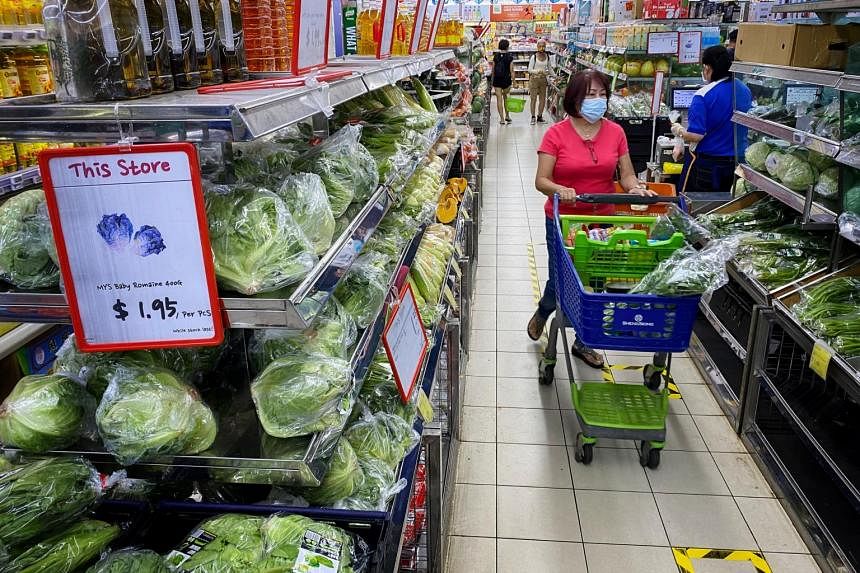SINGAPORE - Grocery shopping is a monthly affair for Madam Masleana Mas'od, who rations items such as eggs and instant noodles across four weeks after buying them in bulk at the start of the month.
The 39-year-old lives in a public rental flat in Tampines with her husband and 19-year-old son. She juggles caring for her ailing husband at home with part-time work at a restaurant, which earns her about $800 a month.
About half of her income goes towards groceries for the family, with transport expenses for her and her son, a student, taking up another 15 per cent.
The rising prices of food, utilities and transport are a growing concern for the family, which has fallen on hard times since Madam Masleana's husband, also 39, had to quit his job as a rope access technician at the start of the year because of health concerns.
Madam Masleana said: "Now I have become the sole breadwinner of the family and it is a struggle to manage our expenses, especially unexpected costs like having to put in an additional $100 for groceries at the end of the month or taking a cab for my husband's medical appointments when he is in pain.
"Due to my husband's gastric and muscular conditions, my family usually has home-cooked meals, and I can see how items are becoming more expensive for us in the supermarkets."
While global shocks and Russia's invasion of Ukraine have led to a spike in consumer prices in Singapore in recent months, with inflation hitting a 10-year high, the Ministry of Social and Family Development (MSF) and social service agencies The Straits Times spoke to said they have not seen a significant spike in requests for assistance.
Last month, the Monetary Authority of Singapore said the surge in global energy and agricultural commodity prices will raise domestic inflation for fuel, electricity and gas and non-cooked food, which will, in turn, feed into higher prices for transport and food services over time.
But MSF said it has not observed any significant increase in the number of ComCare short-to-medium-term assistance (SMTA) applications from January to April this year.
As at April 30, about 15,000 households were on the SMTA scheme, MSF added.
Social service agencies The Straits Times spoke to said they have not seen a significant spike in applications for food or financial assistance since the start of the year.
They attributed this to a possible increase in income opportunities for some families, as well as the efficiency of existing government and community support measures.
Mr Nicholas Lai, executive director of Yong-en Care Centre, which operates a food support initiative, said: "Our data showed a slight increase in requests (for food aid) in January and February compared to December, but it has been steady since March.
"If there is a rise in demand and we need to ramp up operations, we are likely to face funding and manpower limitations."
Started in 2009, Yong-en's food support initiative currently caters to about 150 clients, of whom two-thirds are seniors older than 60.
Ground-up charity Free Food For All said it has been receiving about 250 monthly requests for aid compared with 150 a month last year.
Mr Mohamad Faiz Selamat, board director of Free Food For All, said reasons for the rise could be a temporary fall in income in some households or greater awareness of food support services with the launch of a new directory last month. This directory helps those in need search for food charities across the island.
Social service agencies said they would ramp up operations or refer beneficiaries in need to other community organisations if demand goes up in the future.
A spokesman for Beyond Social Services said: "We will continue to follow up closely with our members and reach out to them with the networks that we have, and do any necessary assessments when the requests for support come in."
Government social support measures are also in place to help households tide over the rising cost of living.
The enhanced permanent GST Voucher (GSTV) scheme, for instance, will provide continuing help to defray the goods and services tax (GST) expenses of lower- to middle-income Singaporean households.
The scheme comprises four components - cash, MediSave, U-Save and service and conservancy charges rebate. The Ministry of Finance said about 1.5 million adult Singaporeans are expected to benefit from GSTV - cash this year.
About 600,000 public transport vouchers have also been set aside to help lower-income commuters cope with public transport fare hikes that kicked in on Dec 26 last year.
Each voucher is worth $30 and can be used to top up fare cards or buy monthly concession passes.
Families like Madam Masleana's make ends meet with the help of schemes such as ComCare SMTA.
She received $750 and subsidies for rent and utilities in February and March. She currently receives $150 a month to supplement her income and subsidies for her rent and utilities.
She also taps Free Food For All for ready-to-eat meals that are suitable for her husband.
Despite the assistance, Madam Masleana said that if prices continue to rise, she would have to choose between her caregiving responsibilities and working longer hours.
She said: "About $50 worth of groceries may last us only two or three days now, compared with five days previously. If the costs keep going up, I will have no choice but to work longer hours and won't be able to care for my husband."

